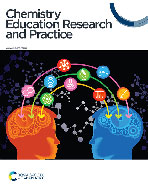Predictions of success in organic chemistry based on a mathematics skills test and academic achievement†
Abstract
Organic Chemistry I presents challenges to many students pursuing diverse fields of study, oftentimes curtailing further progress in those fields. The ability to identify students at risk of unsuccessful course outcomes may lead to improved success rates by offering tailored resources to those students. Previously identified predictors include college entrance exam scores, grade point averages (GPA), General Chemistry II course grades, first exam scores, and results from a logical thinking assessment. This work explores the use of the 20-item Math-Up Skills Test (MUST) in a first-semester organic chemistry course over two years at a small private university. Analysis of scores on the MUST, which is taken during the first week of the semester, indicates a statistically significant difference between successful and unsuccessful first-time students (n = 74 and 49, respectively) as the MUST has good internal consistency (Cronbach's alpha = 0.861) and a large effect size (Cohen's d = 1.29). Taken alone, the MUST predicts students at risk of not passing the course with 64% accuracy; addition of start-of-term science GPA data improves predictions to 82% accuracy. Predictions are further improved with incorporation of scores from the first exam of the semester. Observations to date indicate that the MUST is an easily administered assessment that can be utilized alone or as part of a trio of measures to predict success in first-semester Organic Chemistry. Implications of a mathematics assessment as a predictor for Organic Chemistry are addressed.


 Please wait while we load your content...
Please wait while we load your content...